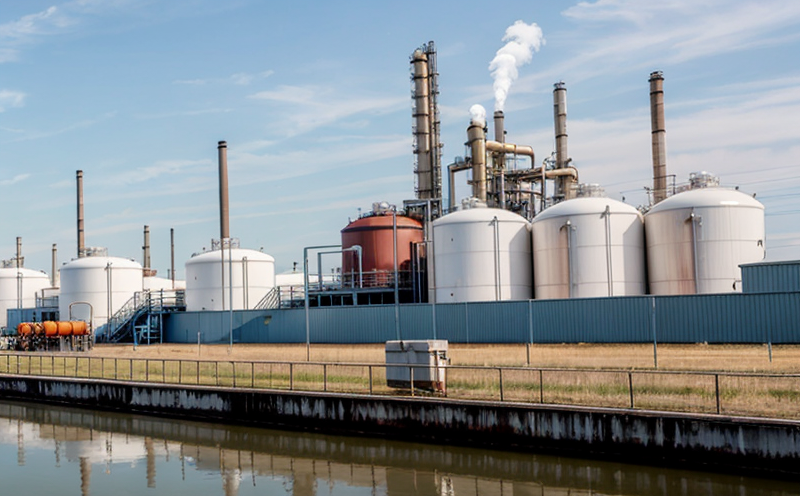BS 10175 Chemical Safety Testing of Contaminated Land
The British Standard BS 10175 is a fundamental document in the realm of environmental chemistry and industrial safety. It provides a structured approach to assessing chemical contamination levels within contaminated land, ensuring that hazardous substances are identified and managed appropriately for public health and ecological sustainability.
Contaminated land poses significant risks to human health and the environment if not properly addressed. The standard outlines methods for sampling, analysis, and interpretation of data from contaminated sites, making it a critical tool for environmental professionals and regulatory bodies alike.
The process begins with thorough site assessment, including an evaluation of historical records, geology, and potential sources of contamination. This preliminary work helps to identify the most likely contaminants present on-site, allowing for more targeted sampling efforts.
Sampling methods recommended by BS 10175 include soil core drilling, surface scraping, and water sampling at various depths depending on suspected contaminant types and distribution patterns. Samples are then transported to our accredited laboratory where they undergo rigorous testing according to internationally recognized standards such as ISO and ASTM.
- Sample preparation: Soil samples are dried, sieved, and homogenized before analysis. Water samples may require filtration or other pretreatment steps.
- Testing procedures: Analytical techniques used include inductively coupled plasma mass spectrometry (ICP-MS), gas chromatography-mass spectrometry (GC-MS), high-performance liquid chromatography (HPLC), and atomic absorption spectroscopy (AAS).
- Data interpretation: Results are compared against regulatory thresholds specified by local authorities or international guidelines like the European Union's Water Framework Directive.
Our team of experts will provide detailed reports outlining our findings, along with recommendations for remediation actions if necessary. Compliance officers and quality managers can use these insights to ensure their operations meet legal requirements while protecting public health and safety.
By adhering strictly to BS 10175 guidelines throughout the testing process, we guarantee accurate identification of all relevant contaminants and provide reliable data that informs informed decision-making regarding site remediation efforts. This ensures compliance with both national regulations and international best practices.
Applied Standards
The British Standard BS 10175 is widely recognized as one of the most comprehensive standards for assessing chemical contamination in land. It specifies procedures for sampling, analysis, and interpretation of results from contaminated sites.
- Sampling: The standard recommends various methods based on the nature of contaminants suspected at a site including soil coring, surface scraping, and water sampling.
- Analysis: A range of analytical techniques is specified such as ICP-MS for metals, GC-MS for organic compounds, HPLC for pesticides, and AAS for trace elements.
- Data Interpretation: Results are compared against regulatory limits set by relevant authorities or international standards like the EU's Water Framework Directive.
The application of this standard ensures that all aspects of the testing process are carried out consistently across different locations and projects. This consistency is crucial for ensuring accurate results and reliable conclusions about contamination levels at any given site.
Our laboratory adheres strictly to these standards during every stage of our chemical safety testing services, from initial sample collection through final report generation. By doing so, we maintain high levels of accuracy and precision in all our work, which is essential for making informed decisions regarding contaminated land management.
Eurolab Advantages
At Eurolab, we pride ourselves on delivering exceptional chemical safety testing services that adhere to the highest standards of accuracy and reliability. Our team of experts is committed to providing clients with comprehensive solutions tailored specifically to their needs.
- Dedicated Resources: We invest in state-of-the-art equipment and facilities dedicated solely to chemical analysis, ensuring top-notch performance every time.
- Expert Knowledge: Our staff possess extensive experience in environmental chemistry and have access to the latest research findings and trends within the industry.
- Accreditation: Eurolab holds accreditations from leading bodies such as ISO/IEC 17025, EN ISO/IEC 17025:2017, which guarantee our competence in performing tests according to specified requirements.
We understand that each client has unique challenges when it comes to assessing and managing contaminated land. That's why we offer flexible service packages designed to suit individual projects' specific requirements. Whether you need help with initial site assessments or ongoing monitoring programs, we have the expertise to support you every step of the way.
Our commitment to excellence extends beyond just meeting regulatory expectations; it also includes providing timely communication and transparent reporting throughout each project. By working closely with our clients, we ensure that all stakeholders are kept fully informed about progress and any necessary adjustments along the way.
Quality and Reliability Assurance
To maintain high standards of quality and reliability in our chemical safety testing services, Eurolab implements a robust Quality Management System (QMS) based on ISO/IEC 17025:2017. This system ensures that all aspects of the testing process—from sample collection to final report generation—are conducted consistently and accurately.
- Sample Handling: Samples are handled with care using appropriate protective gear and procedures designed to prevent contamination or degradation during transit to our laboratory.
- Analytical Methods: We employ validated analytical methods that have been proven reliable through extensive validation studies. These methods include ICP-MS, GC-MS, HPLC, AAS, among others.
- Data Validation: Before reporting results, our data undergoes rigorous validation checks to ensure its accuracy and precision. Any discrepancies are investigated immediately until resolved satisfactorily.
We also participate in proficiency testing programs organized by recognized organizations such as A2LA (Accredited Laboratory Association) or ILAC (International Laboratory Accreditation Cooperation). These programs provide independent verification of our analytical capabilities, further enhancing confidence in the quality and reliability of our services.
Our commitment to continuous improvement means that we regularly review our processes and update them as needed to stay ahead of industry developments. By doing so, we ensure that our clients receive the most up-to-date information possible when making important decisions about contaminated land management.





